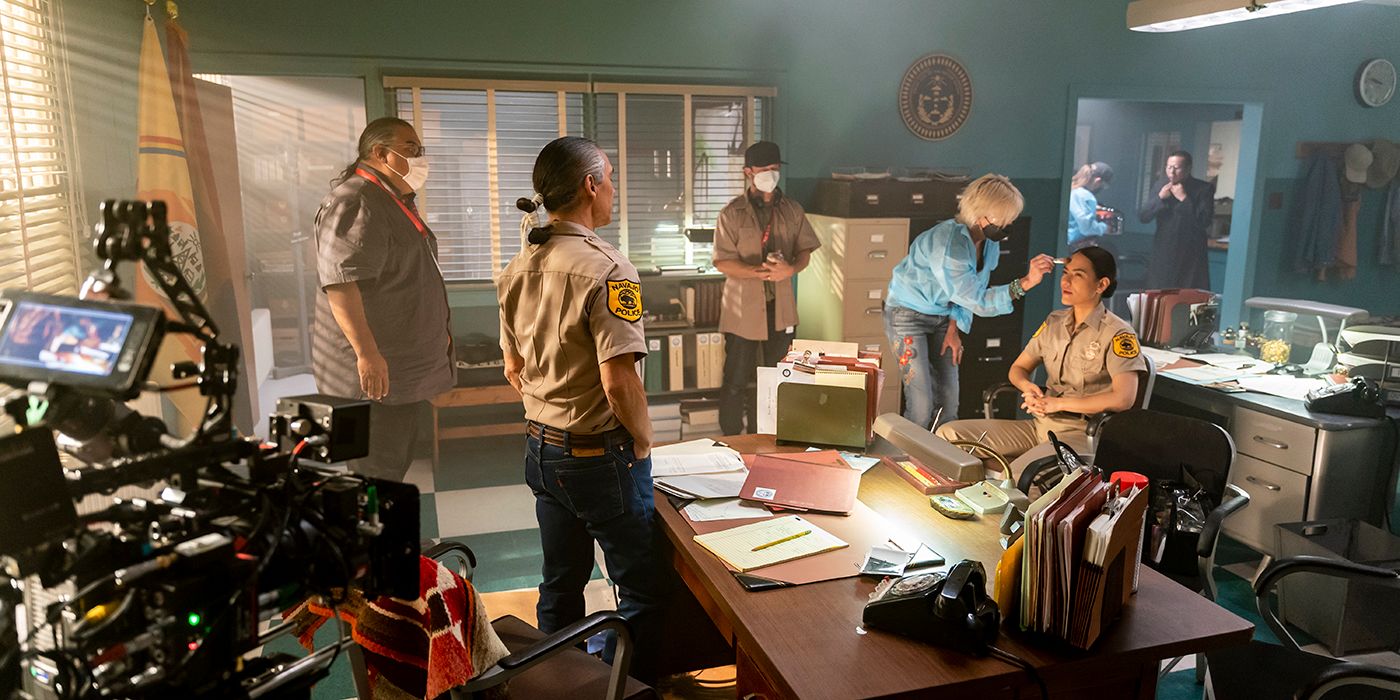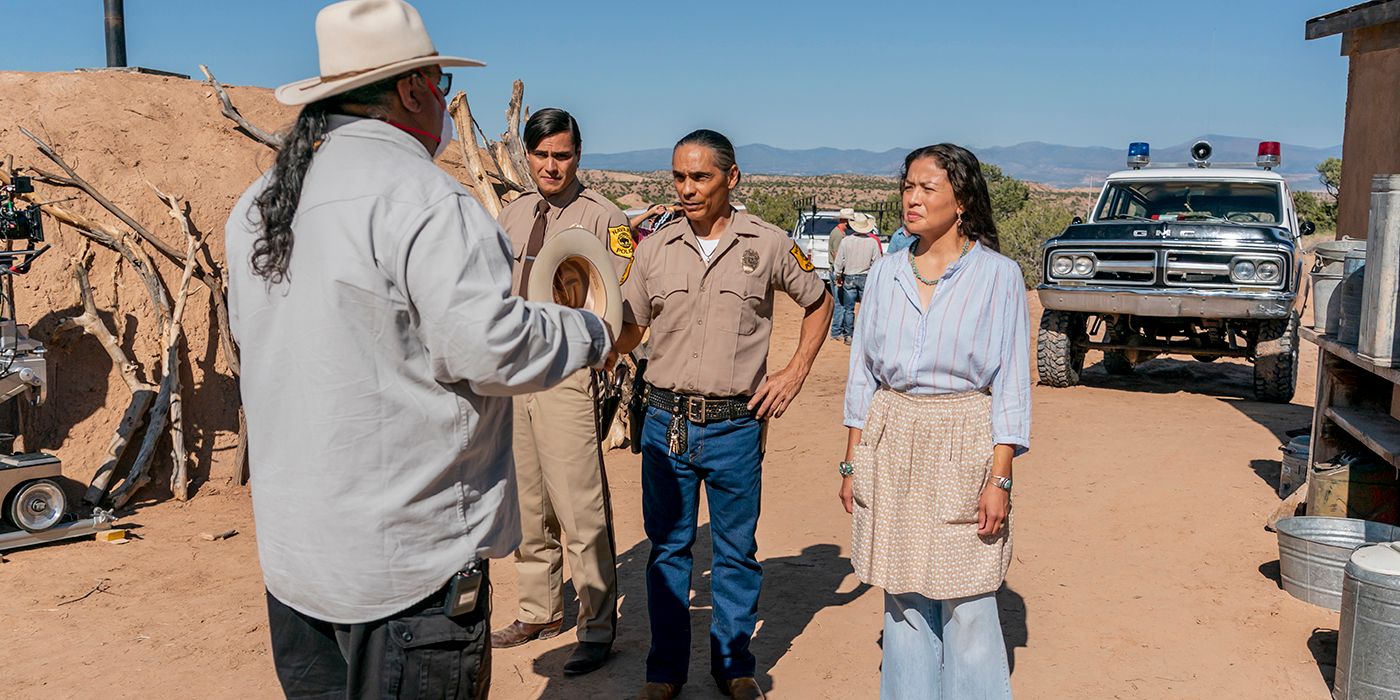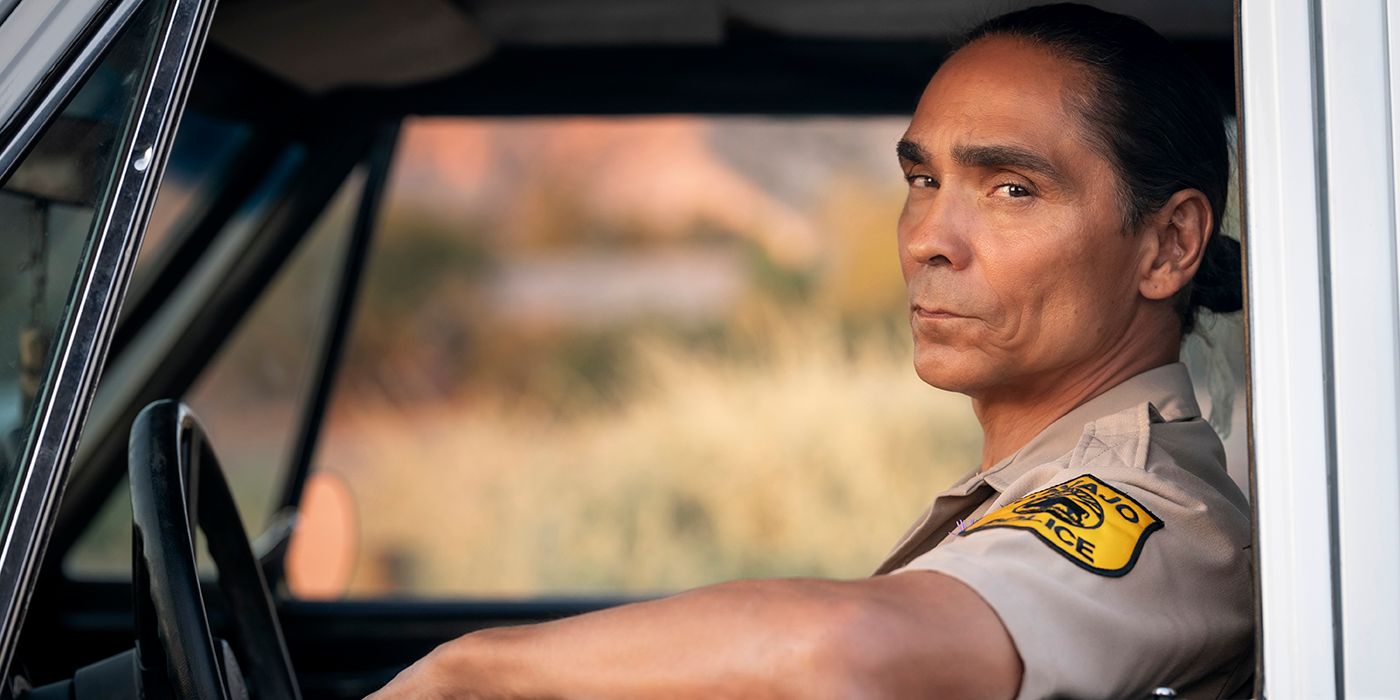Dark Winds, AMC's new thriller series based on the iconic Leaphorn & Chee book series by Tony Hillerman, premiered its first 2 episodes on Sunday and kicked off a fascinating mystery. Opening with both a double homicide and a bank robbery is no small feat, and it means that Lieutenant Joe Leaphorn (Zahn McClarnon, Westworld) has his work cut out for him.
The series takes place in 1971, and focuses not only on how the Navajo community deals with the strange events affecting their reservation, but also how they must handle the outsiders who attempt to interfere. Leaphorn is joined in this task by his second-in-command Bernadette Manuelito (Jessica Matten, Burden of Truth) and new deputy Jim Chee (Kiowa Gordon, Roswell, New Mexico), who has just returned to the reservation for the first time since college.
Screen Rant spoke to director Chris Eyre and writer Graham Roland about portraying both the time period and the Navajo culture authentically, exploring the marital dynamic between Joe and Emma (Deanna Allison) further, and counting on the support of George R.R. Martin & Robert Redford.
Screen Rant: Dark Winds is set in the '70s, and it really feels like I've been transported back in time. What is it like making that setting authentic, and making sure the aesthetic really matches with the time period?
Chris Eyre: It's a blast. It's a lot of fun to get to see all these great props, picture vehicles and robbery trucks. One of the funny things was that the helicopter was 50 years old. I guess they don't depreciate; airplanes and helicopters don't depreciate quickly. I was like, "This isn't 50 years old," but they're like, "Yeah, that's the 1970s helicopter." It's a real pleasure to do a period piece.
I put Little Big Man on the marquee as the helicopter leaves town, as an homage to one of my favorite movies of all time, which is a Little Big Man with Chief Dan George. I just think it has so many connective connotations with all this good stuff that we're doing in the series. The settings and the beauty of the landscape just make for a rich world, and it's a pleasure to try and transport people there.
Graham, what is the collaborative process like when it comes to deciding on the aesthetic or the direction of certain scenes?
Graham Roland: Writing the pilot and then developing the beginning of the story, we had an amazing group of writers who came in and wrote their own scripts based on my pilot. But for me, it was just a collaborative process with Chris and the other executive producers the whole way. To your to your 1970s point, one of the first things they mentioned when I sat down with them was that they wanted to keep it consistent with the books. That was a decision that they had made prior to me getting involved, but it really worked out nicely.
The sad irony is that the reservation hasn't changed all that much in 50 years. You may be there today and catch a glimpse of an iPhone or a pair of Nikes, or something like that, and be reminded that we're in 2022. But as Chris and I were talking earlier, only now are some parts of the reservation getting electrical grids. It's a little bit of a time capsule in that way.
In terms of collaborating, it's really just conversations and communication. Giving Chris and the other executive producers drafts and having them react, then getting notes back. And then as we got closer to filming, Chris and I had already been working on this together for a little over two years. I had a really good idea of what he was going to do, and he had a really good idea of my aesthetics and taste. It was really just a process of getting to know each other and talking about movies that we loved that could have a parallel to something in Dark Winds.
It's fascinating to hear the actors speak in the Navajo language with actual subtitles. How was that decision made, and was that is that written into the script to begin with? Or do you have translators who then feed the lines to give to the actors?
Chris Eyre: That's a really good question. There was no question for us that we wanted Navajo language as a pillar of authenticity. There's all sorts of stories about language, and how it's such a cultural component.
But I think what we did was - and Graham can speak to it, because it was his pilot - Graham wrote some dialogue that outlined the idea. And then certain words don't exist in Navajo that do in English, so we basically had a translator that would then give the intent and best practice towards what was written in terms of dialogue. And they would work with the actor on correct pronunciation and what was being said. It was a process of meaning; what's the meaning behind it.
Graham, I have to say that Emma is one of my favorite characters. What can you say about her marriage to Joe and that dynamic that they have?
Graham Roland: [Author Tony Hillerman] set the dynamic up in his books. They had a very good marriage, a very solid partnership and a loving relationship in the novels, and we definitely wanted to show that. But she wasn't a midwife, so that's something that that we talked about, because we wanted to - not so much make her more formidable, because she already was a formidable character - have a way to integrate her into the community.
She inadvertently finds herself integrated into this mystery that Joe is involved in, but from a different angle. That was really where did the decision came from, and we all liked the idea of these two people being servants of their community in different ways.
Chris, how do you approach the more mystical elements of the story, and the matter-of-fact way that the characters treat them?
Chris Eyre: I think the way to treat them that I discovered was to not objectify those things, but rather to show them and let the audience extrapolate.
When Bernadette smudges herself off, there's a correct prescription of what she's doing, but it's not even seen on camera completely. It's more about observation, and it's more about knowing that in any part of the world, people have similarities with prayer and all sorts of stuff. You understand what she's doing without knowing exactly how she's doing it.
We had those conversations as well, which is that this is about the respect of observing, and not telling people. The scenes that happen to have something to them that that is of another dimension, they're simply an observation of what could be; it's the potential of what people as characters are feeling or thinking.
Bernadette slaps the hand away of the woman who's reaching, and you're saying to yourself, "Wait a minute, what is she doing?" But Bernadette knows exactly what she's doing. Bernadette stares at her, like, "I can't believe this." And the audience implicitly understands, "Wait a minute, I think she was reaching for something. Was that a hair?" I think you give it the respect of showing and the respect of not explaining.
This is not the Winds I would have first expected to see with George R.R. Martin's name attached. But how cool is it to have his name attached, and to have him supporting the project?
Graham Roland: Chris could probably speak to this more than I can, but I'll just throw in my two cents. If it weren't for George R.R. Martin and Robert Redford, I don't know that we would be making the show.
It's not a show that I've ever seen before on TV, and sometimes to get things through the pipeline of development that are different and riskier, you have to have a bigger name and you have to have a bigger presence attached to push it through. Certainly, having those two gentlemen attached to this project and championing it for all these years is probably the reason we're talking to you today and we have this show.
Dark Winds Synopsis
Set in 1971 on a remote outpost of the Navajo Nation near Monument Valley, Dark Winds follows Lieutenant Joe Leaphorn (Zahn McClarnon, The Son, Westworld, Fargo) of the Tribal Police as he is besieged by a series of seemingly unrelated crimes. The closer he digs to the truth, the more he exposes the wounds of his past. He is joined on this journey by his new deputy, Jim Chee (Kiowa Gordon, The Red Road, Roswell, New Mexico). Chee, too, has old scores to settle from his youth on the reservation. Together, the two men battle the forces of evil, each other and their own personal demons on the path to salvation.
Read our other interviews with Dark Winds stars Zahn McClarnon, Kiowa Gordon & Jessica Matten and Jeremiah Bitsui.
The first two episodes of Dark Winds are currently available to stream on AMC+, with new episodes premiering on AMC Sundays at 9pm ET.



